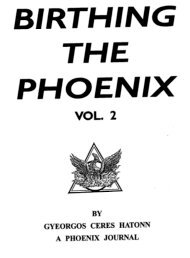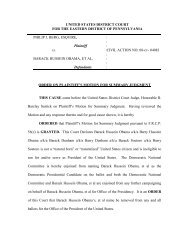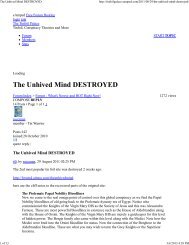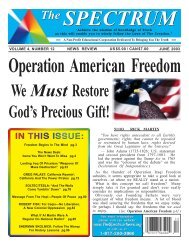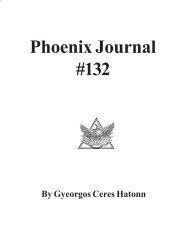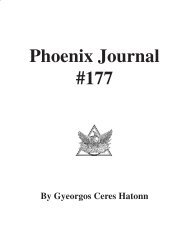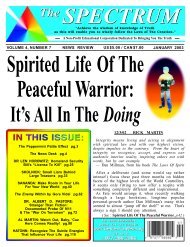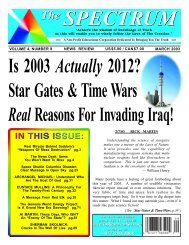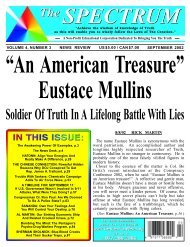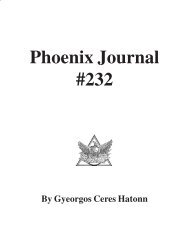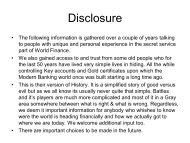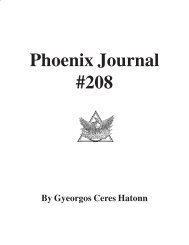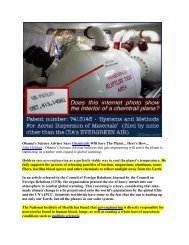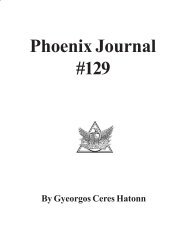Create successful ePaper yourself
Turn your PDF publications into a flip-book with our unique Google optimized e-Paper software.
Mam (grandmother) was the enforcer. Mam kept track of who was bad and kept a record sitting right up<br />
there on top of the warming oven, in a crock. She and Pa (grandfather) would not fall for our little stories,<br />
or our shenanigans. The rules were followed to the strictest measures (Ten Commandments, rules of<br />
ethics, rules of morals, rules of conduct and rules of the house). Now to understand Mam, you would have<br />
to understand a Southern, hard-shelled Baptist! That was Mam. What Mam said was law: count on it!<br />
Not even Pa ventured so far as to make Mam unhappy. Many a time, I saw that little lady (she was less<br />
than 5 ft. tall), take a broom and soundly smack Pa in the backside until out the door he went, at which time<br />
he would stand outside under the plum tree, hands behind his back, shuffling from one foot to the other until<br />
Mam allowed him back into her house. When he reentered, his plate was turned upside down for a spell.<br />
This is called respect. Each respected the other, and each respected the rules and the application of<br />
methods of punishment for breaches.<br />
Pa, and his seven brothers, Will, Lon, Arthur, Henry, John, James and Phil Carey started out as Texas<br />
Rangers. Henry later became a judge. Pa went into the service of the U.S. Marshal’s office. This was a<br />
pretty much do-it-by-the-book and no-nonsense family. We had the rules and we lived by them.<br />
It is wondered by me what this generation of law makers, and law enforcement officers, some Texas<br />
Rangers, some Territory Marshals, a president and a judge would have thought about all of this going on in<br />
our current administrations, including and not excluding, the <strong>10</strong>4th U.S. Congress’ “Contract on America”.<br />
Then I wonder what would Mam have done if she would have had these bad boys and girls in her house<br />
breaking the rules???<br />
NOW THINK ABOUT THIS!<br />
In Mam’s day the women raised chickens, had gardens, did sewing, etc. They sold the excess eggs,<br />
sewed for other women and sold the excess canned products. From this the household could run through<br />
emergency periods. Winter expenses were met. Doctor’s bills, etc., could be paid. These were the<br />
emergency household funds.<br />
These emergency funds were, in essence, for (a) the common use of the household, (b) use for common<br />
defense against what ever came up against the family unit, and (c) it was a common fund of protection.<br />
This emergency fund was commonly called the egg money.<br />
THINK ABOUT IT!<br />
When taxes are collected and paid into the U.S. or state treasuries, this is the community egg money. It<br />
was collected for common defense, general welfare and for the guarantee that all laws be made which<br />
were necessary to protect and insure the common defense and general welfare of the common family<br />
communities. For this purpose Congress was authorized to lay taxes, posts and duties on foreign imports.<br />
Those same provisions are granted to the civil governments of the territorial states (those not among the<br />
original thirteen states of the United States). The civil governments of our states laid taxes for the common<br />
defense and general welfare to protect these inhabitants within that state from falling into harm’s way, and<br />
for that purpose attorneys general were appointed for the specific purpose of (1) insuring the moneys<br />
collected from taxation were spent according to the taxation, and (2) to insure that the laws of the people<br />
30



